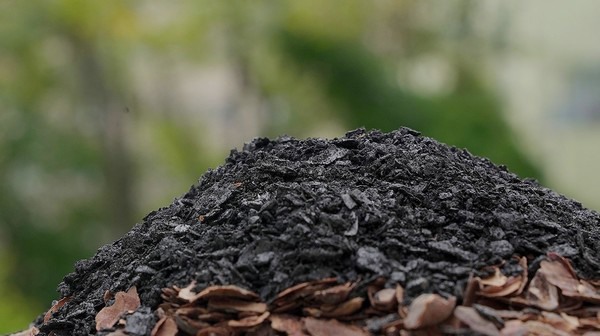Circular Carbon GmbH operates the first industrial plant for the production of biochar in Hamburg. The company carbonizes nutrient-rich cocoa shells, a residual material from cocoa production, by pyrolysis, a decomposition reaction in which organic materials break down in the absence of oxygen. Biochar is currently mainly used as a soil additive to improve depleted soils in horticulture or agriculture. When added to the soil, biochar can sequester the carbon it contains and thereby act as a carbon sink. It can also be used in flood management to turn a city threatened by flooding into a "sponge city." The biochar can absorb excess water from heavy rainfall and release it back to urban trees in times of heat stress and drought. In animal farming, biochar increases feed efficiency and residual plant digestibility. In addition, the methane emissions of animals can be reduced, thereby reducing greenhouse gas emissions from animal farming. Other organic materials, such as oat husks, straw, or green waste, are equally suited for the pyrolysis process. The certified Circular Carbon biochar is available for delivery directly from the plant.

The Intergovernmental Panel on Climate Change, the IPCC, has recognized biochar as a method of CO2 sequestration. Circular Carbon has multiple certifications, including by CerTrust with the Certificate of Quality Assurance of the Production Process (abbreviated to CE approval as a fertilizer and soil additive in accordance with EU Regulation 2019/1009) and GMP+ from DEKRA for animal feed.
Advantages of biochar for the farmer: less fertilizer, improved humus formation, and higher yields
There are considerable advantages of using biochar in agriculture from both a chemical and biological point of view: biochar increases the cation exchange, the balance of nutrients and bases is supported, humus formation is improved, the nutrients potassium and phosphorus are mobilized, and the nitrogen balance becomes more sustainable, which leads to a reduction of industrial fertilizers use. Since biochar also increases the pore volume of the soil and counteracts soil compaction, it also improves the water retention capacity and the air balance in the soil.
Advantages of biochar for the farmer: healthy animals, improved stable climate
In animal farming, biochar has proved to increase feed efficiency and residual plant digestibility. This results in higher milk yield, better weight gain, and higher quality of animal products, such as higher protein content in milk or meat. Thanks to a reduction in ammonia emissions, the climate in the barn is improved, which makes the animals more vital and healthier and reduces the cost of veterinary services and medication.
The effects of biochar are highly complex as it changes the soil sustainably over time, so the "biochar capital" is "paying interest."
For more information:
Circular Carbon
circular-carbon.com
econnext
econnext.eu

